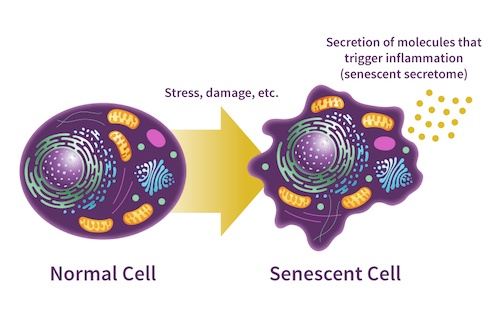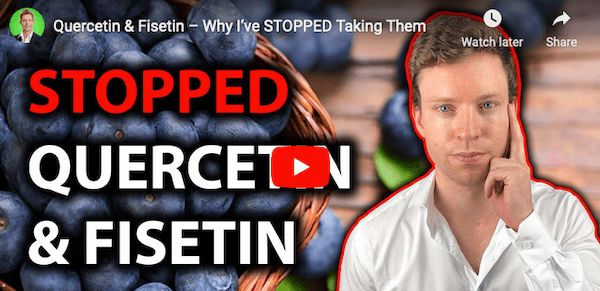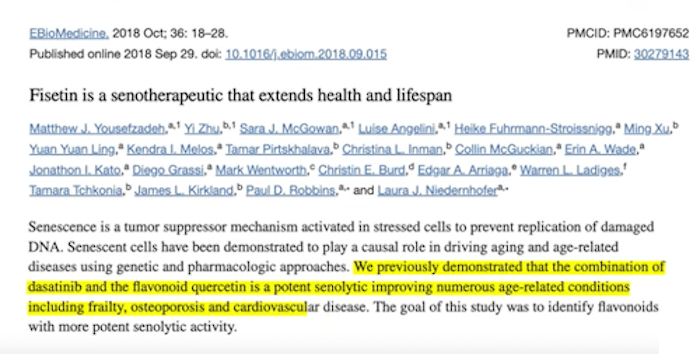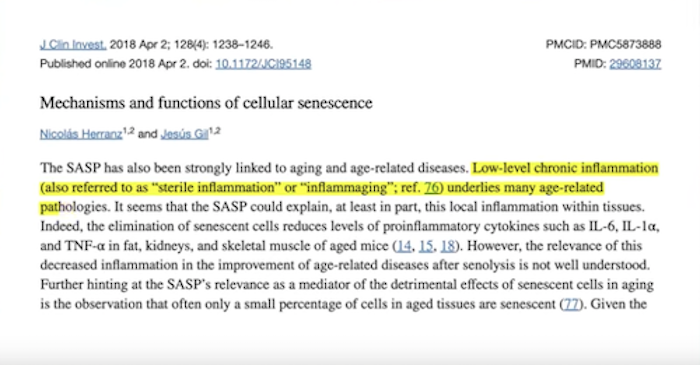Fisetin Supplement — Good or Bad?

Fisetin supplement, good or bad — that’s the question that needs an answer should you be using fisetin to help get rid of those pro-aging senescent cells. Here’s the latest per Dr. Brad Stanfield’s video — watch.
A fisetin supplement is neither good or bad. That’s the conclusion of a highly regarded study that examined the effectiveness of fisetin as a senolytic, which is the primary reason I know of to consider its use.
I used to recommend a fisetin supplement, and some other compounds I’ll address in this post, as a good, safe way to get rid of those age-promoting senescent cells. But what was once touted in various studies is now being challenged, which is what science is supposed to do.
Many studies over recent years assert that fisetin, along with desatinib, querctin and piperlongumine, are potent senolytics that reduce senescent cells. I’ve been taking these compounds and, as just mentioned, have written several posts encouraging their use.
Now a recent study conducted by the venerable Interventions Testing Program at the National Institute on Aging casts shade on all those pro-senolytic studies that tout the efficacy of various purported senolytics, such as fisetin, quercetin and dastinab, among others (see here and here). The NIA study doesn’t say that these senoytics are harmful, just not helpful to get rid of senescent cells.
Let me back up a bit and provide context.
As Dr. Brad Stanfield explains in his video below, as we age our body get overwhelmed with old cells that can no longer grow or divide. These zombie-like senescent cells just hang around and excrete a mix of chemicals toxic to nearby healthy cells. Although senescent cells do have a useful purpose, too many of them makes it difficult for our organs to perform properly.
 The useful purpose of senescent cells is to keep old or damaged cells from growing and dividing, thereby potentially damaging DNA. That said, although we don’t want senescence from occurring at all, ideally, we want to be able to clear from the body old senescent cells that have done their job.
The useful purpose of senescent cells is to keep old or damaged cells from growing and dividing, thereby potentially damaging DNA. That said, although we don’t want senescence from occurring at all, ideally, we want to be able to clear from the body old senescent cells that have done their job.
What we don’t want is for senescent cells to accumulate and accelerate aging, which they will do, given that their chemical secretions — called senescence-associated secretory phenotype (SASP) — contributes to
the chronic inflammation that underlies many age-related diseases.
Senescent cells so clearly negatively impact aging, that efforts to reduce or eliminate them has has spawned a relatively new branch of gerontology that is pursing effective senolytics. As I mentioned, many studies have indicated that fisetin, desatinib, querctin and piperlongumine, among others, can help clear senescent cells, but now the NIA study puts that conclusion into doubt.
Dr. Brad Stanfield: “I stopped taking fisetin and quercetin”
Dr. Brad Stanfield is a New Zealand-based physician who has a very popular YouTube channels that reviews studies about aging, with the focus being on interventions (geroprotectors) that might increase healthspan, and slow down the rate of aging.
Based on some new evidence, he recently cast some shade on the widely purported benefits of resveratrol, which led me to comb through my pro-resveratrol posts and update them with a link to an updated resveratrol post entitled, Does Resveratrol Really Activate Sirtuins?, just as I did for my several pro-fisetin posts that now link to this post.
In the video below, Dr. Stanfield says the no longer takes a fisetin supplement, or quercetin, and makes the following two points, among several, based on his reading of pro-fisetin senolytic studies relative to the NIA study:
- Pro-fisetin, pre-clinical (non-human) studies use inbred mice as opposed to genetically diverse mice, which disposes them to be more susceptible to fisetin as a senescence clearer, and less applicable to humans.
- The best pre-clinical studies are done at the NIA interventions testing program, largely because its results as reproducible at other labs. Its use of genetically diverse mice showed no senescent-clearing capability of fisetin.
My Conclusions On Fisetin Supplements, etc.
My senolytic supplement stack consists of:
- Quercetin, a plant polyphenol from the flavonoid group;
- Piperlongumine, a natural product derived from the fruit of the Asian Long pepper; and
- Fisetin, a flavonoid and antioxidant.
But in light of the conclusions of the NIA study, I’m pushed to reevaluate the usefulness of those compounds and whether I want to keep consuming them.
About Fisetin
Dr. Stanfield’s summary of the NIA study makes it clear that fisetin may not be useful in clearing senescent cells, and that he’s no longer going to supplement with it. He also cites an ongoing senolytic human trail conducted by the Mayo Clinic that he is eagerly awaiting the results from, but the Mayo clinic has already conducted a study in 2018 called Fisetin is a senotherapeutic that extends health and lifespan, which made this observation:
Of the 10 flavonoids tested, fisetin was the most potent senolytic. Acute or intermittent treatment of progeroid and old mice with fisetin reduced senescence markers in multiple tissues, consistent with a hit-and-run senolytic mechanism.
OK, but as Dr. Stanfield underscored, it’s an error to presume that the results garnered from using inbred mice can extend to wild bred and to humans. The above cited Mayo Clinic did use mice altered to be progeroid (“progeroid” is a genetic disorder that makes an organism appear older than it is), but the study also used wild-type mice, and about that cohort the researchers concluded:
Administration of fisetin to wild-type mice late in life restored tissue homeostasis, reduced age-related pathology, and extended median and maximum lifespan. Interpretation: The natural product fisetin has senotherapeutic activity in mice and in human tissues. Late life intervention was sufficient to yield a potent health benefit.
About Quercetin
Dr. Stanfield also says he’s going to stop taking quercetin as well, although the NIA study did not dispute its usefulness as a senolytic.
Besides its potential capability as a senolytic, quercetin is thought to offer many other benefits other than its purported role as a senolytic. As the supplement research site, Examine.com summarizes, quercetin:
- Quercetin is the most well researched of all bioflavonoids, and offers “tons” of useful interactions, and synergistic interactions with other bioflavonoids, including their absorption.
- Like many other bioflavonoids, quercetin has anti-oxidant, anti-artherogenic, and anti-carcinogenic properties.
Healthline.com’s review of several quercetin studies concludes:
- Quercetin may improve inflammation, blood pressure, exercise performance, and blood sugar management.
- Quercetin may have brain-protective, anti-allergy and anticancer properties. Still, more research in humans is needed.
So, quercetin supplementation might be beneficial even if it’s not a good senolytic.
About Piperlongumine
Interestingly, although quercetin is thought to help improve the bioavailablity of other flavonoids, it itself is poorly absorbed, which is where piperlongumine (or peperine) comes into the picture. Basically, a derivative of black pepper, piperlongumine helps your body absorb other compounds ingested along with it.
Piperlongumnine is a relatively inexpensive supplement and well worth taking to help ensure that the rest of the supplements you consume are absorbed.
My Bottom Line
I’m definitely less enthused about fistein as an effective senolytic than I was before Dr. Stanfield took the wind out of my sails. I’m going to stop using it for now, and look for the publication of the new Mayo Clinic human trails once completed that tests fisetin and other potential senolytics.
If you’re not a Subscriber, go become one now so you can be alerted about all the new longevity studies getting published.
Last Updated on September 29, 2022 by Joe Garma





